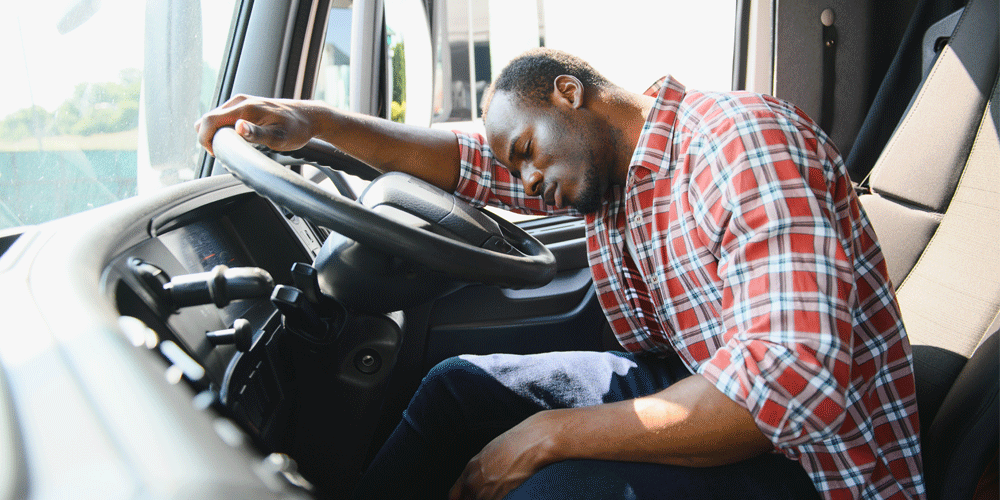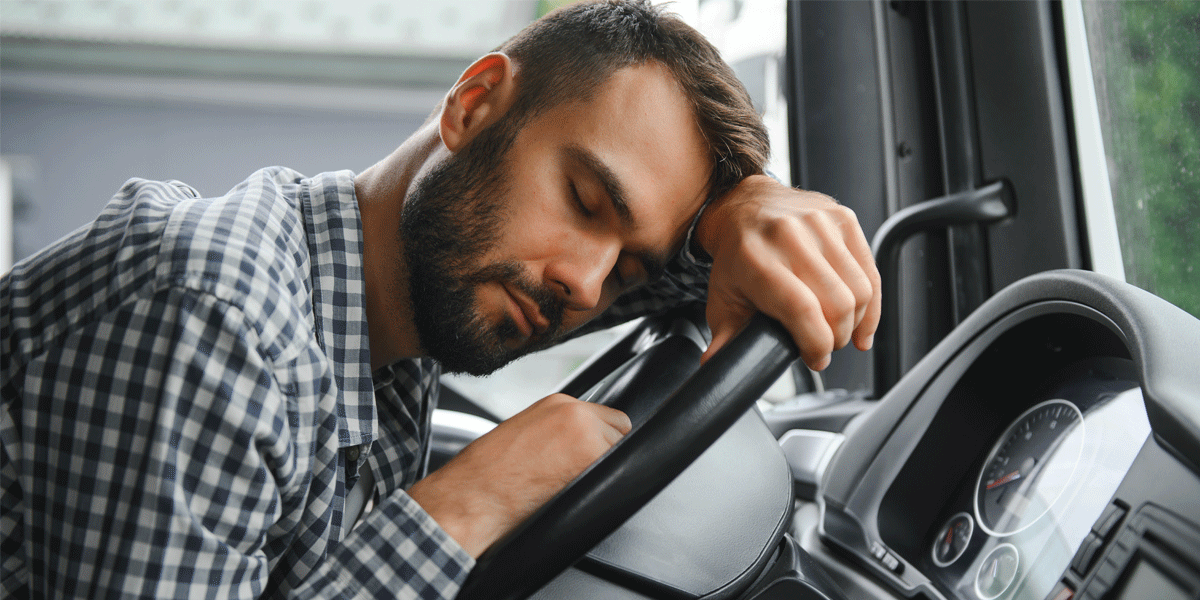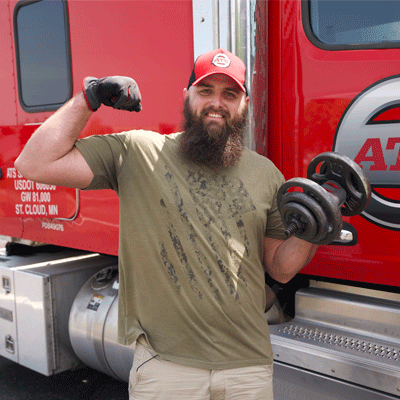Robert has been in the trucking industry for more than a decade. He's been a flatbed driver at ATS since 2021.
1 sheep, 2 sheep, 3 sheep, 4 sheep….
Do you find you’re struggling to get to sleep each night in your cab?
Sleep is important to everyone’s well-being, but it’s especially crucial for people operating heavy equipment around the motoring public — like truck drivers. As a truck driver myself who’s been in the industry for more than 10 years, I know this all too well.
One bad night of sleep and you’re lethargic the next day and reaching for caffeine. Then you’re slamming caffeine all day and it messes up your sleep another night. And then the pattern continues. Either that or you’ll find yourself taking lengthy naps throughout the day and lacking productivity. Falling asleep behind the wheel is not only a danger to yourself but also to your fellow road warriors and drivers.
Being on the road for weeks at a time and trying to sleep in your truck is difficult. You’re away from home and lonely, and let’s just say that your bunk isn’t nearly as comfortable as a real bedroom.
Ensuring you get good rest each night is crucial, so here are some tips to help you count fewer sheep and catch more z’s.

The Importance of Sleep
First and foremost, good sleep is all about road safety. When you're well-rested, you're alert and focused, and that means you're less likely to cause accidents. We all know that accidents involving trucks can be particularly devastating due to their size and weight.
Moreover, drowsy driving is a leading cause of accidents on the road. Ensuring you're well-rested helps prevent these incidents. It's not just about your safety, but also the safety of everyone else on the road and the valuable cargo you're hauling.
Hours of Service (HOS) regulations require drivers to take a 10-hour break after a full day of driving and a 30-minute break after eight cumulative hours of driving. These rules are there to prevent driver fatigue and maintain road safety.
Complying with them isn't just a legal requirement; it's essential for you and the safety of everyone on the road.
Your health is also on the line. Poor sleep can lead to serious health issues like obesity, diabetes, depression and heart disease. Your emotional well-being matters too.
Sleep deprivation can lead to mood disturbances, depression and increased stress, which isn't good for anyone — especially when you're dealing with long hours and isolation on the road.
Being well-rested significantly impacts your cognitive performance. You need to make quick decisions, navigate routes and handle documentation and cargo efficiently. Adequate sleep enhances your memory, attention and problem-solving skills, making you a more effective and safer driver.
Sleeping Tips for Truck Drivers
These tips will help you fall asleep and stay asleep so you can wake up feeling rested each day.
Find a Safe Place to Park and Sleep
First and foremost, you need to find a safe place to park and sleep. You need to feel safe going to sleep without worrying that someone will mess with your truck and trailer or hit you. That means no parking on the side of the road, in sketchy parking lots in the middle of nowhere or on off-ramps.
Trip plan each day so you know where you can park when the time comes to take your 10-hour break. Give yourself plenty of time to get there and plan out a few spots where you can stop just in case one place is full or you don’t get as far as you planned one day. If needed, you can even reserve a parking spot.
Related: Follow these tips to make sure you feel safe in your truck at all times
De-Stress
Driving is a mental game, not a physical game. You’re dealing with cranky customers and bad drivers on top of everything that’s going on at home with your family. By the end of the day, you’re mentally exhausted but wired. You have to find a way to get rid of that energy and pent-up stress.
The way I get rid of this stress is by exercising. You could go for a walk around the truck stop or do some exercises using your body weight. Yoga is also a great way to relieve stress. Reading and calling your family can also help act as a distraction and get your mind off any stress.
Related: Tips for exercising on the road
Purchase Comfortable Bedding
If you’re not comfortable in your bed, you’re not going to sleep well. Do your best to make your bunk feel homey so it can provide you with a sense of safety — like you’re back at home sharing a bed with your partner.
Invest in comfortable, cooling sheets, warm blankets and a pillow that has the amount of fluff you like. If you don’t like the mattress in your truck, it’s worth it to get a quality mattress topper that’s supportive and comfortable.
Keep Your Bunk at a Comfortable Temperature
Make sure you also keep your bunk at a comfortable temperature for sleeping. Everyone enjoys a different temperature, but keeping it somewhere between 60 to 68 degrees Fahrenheit is considered the ideal temperature for good sleep. A cool room makes it easier to fall asleep and stay asleep; thermoregulation is important for sleep quality.
If you have an auxiliary power unit (APU) and a bunk heater, you’ll be able to stay cool in the summer and warm in the winter easily, but it’s still a good idea to pack extra blankets in your bunk during the colder months.
Block out the Light
When you’re trying to sleep, the darker the room the better. If you’re exposed to too much light during sleep, it can disrupt sleep patterns and lower sleep quality. Block out light to promote deeper, more restorative sleep.
It’s pretty difficult to avoid light from coming in the windows of your truck; there’s always someone driving through the truck stop lot or light from street lights streams in. The easiest and most affordable solution is to sleep with a sleep mask on. If wearing a sleep mask isn’t comfortable for you, invest in blackout curtains that separate your bunk area from your cab. You can also get a sunshade to cover your windshield.
Invest in a Sound Machine or Earplugs
It’s hard to find a quiet spot as a truck driver, so earplugs or a sound machine come in handy if you find it difficult to fall asleep when it’s noisy or if you’re a light sleeper. Both can block out sound. I even know some drivers who wear noise-canceling headphones.
Earplugs are especially crucial if you’re a team driver and you’re sleeping while your partner drives.
Avoid Caffeine and Other Stimulants
Caffeine can mess up your sleep — especially if you’re drinking it too close to bedtime or if you’re consuming too much of it. If you’re tired throughout the day, it can be easy to slide into the bad habit of over-relying on caffeine to keep you awake.
Caffeine can initially have a sedative effect upon consumption, but that effect wears off quickly and then it increases energy and mental alertness. This is why some people drink a cup of coffee before a quick power nap; they wake up just as the energy hits.
As drivers, many of us slam caffeine all day — whether it’s an energy drink or coffee. I used to be able to drink a handful of energy drinks a day (I’ve since quit caffeine).
Caffeine might be great to help keep you alert while driving, but it’s not so great when you want to get some shut-eye. The half-life of caffeine is anywhere from two to 12 hours — which means you should stop drinking caffeine at a minimum of four to six hours before you plan to go to bed.
It’s also important to note that smoking before bed can act as a stimulant and may make it harder for you to fall asleep. So can alcohol. The nicotine in cigarettes stimulates the nervous system by causing the release of epinephrine. As a result, you may deal with insomnia or shorter sleep cycles.
Be mindful of any over-the-counter medications you’re taking, too, as some of them may have stimulants that could keep you up (or subsequently cause drowsiness while you’re driving). If you’re ill, talk to your doctor about safe cold and flu medicines you can take while driving (or simply don’t drive and instead focus on getting better).

Shut Off the Electronics
It’s a hard habit to break, but to ensure sound sleep, you need to stay off your electronics before bed. The blue light emitted from your smartphone mimics daylight and therefore promotes alertness. It can throw off your circadian rhythm.
Not only that but whatever you’re consuming on your devices — be it a violent video game, stressful television show or dramatic social media post — can encourage highly emotional responses or anxiety. Neither of these responses helps you fall asleep.
I know you’re trying to keep in touch with family and friends, browse social media or even play video games to wind down at night. Some of you may be checking the weather so you can trip plan for the next day. However, try to do this at least an hour before you go to bed. That way you have an hour where you aren’t exposed to harmful light.
Start a Nighttime Routine
Stress and anxiety are often linked to sleep disruptions, so you have to get your mind right before you try to sleep. You can do that by starting (and sticking to) a bedtime routine that’s easy to follow and helps you feel relaxed.
It doesn’t have to be a long routine — just a few easy-to-follow activities performed in the same order before you go to bed. The activities should calm you down and set you up for a good night’s sleep. Maybe you write your plans for tomorrow, read a chapter, do a couple of stretches, brush your teeth and turn on your sound machine.
Going to bed at the same time and waking up at the same time is also important — even when you’re on home time.
Take Care of Your Mind and Body
Getting quality sleep is essential for the well-being and safety of truck drivers. Not only does it improve cognitive performance and decision-making skills, but it also reduces the risk of accidents on the road.
By following the tips mentioned in this article, such as finding a safe place to park, managing stress, investing in comfortable bedding, controlling the temperature and light in your bunk, using earplugs or a sound machine, avoiding caffeine and electronics before bed and establishing a nighttime routine, you can improve your sleep quality and overall health.
Prioritize your sleep and take the necessary steps to ensure you get a good night's rest. Your well-being and the safety of everyone on the road depend on it. For more helpful tips and information, be sure to explore the Learning Center.


